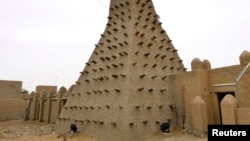UNITED NATIONS —
The United Nations and Malian officials are warning that damage to that country’s cultural sites is greater than first thought. Officials say ancient mosques, mausoleums and manuscripts in the city of Timbuktu have been damaged or destroyed after rebels in the north of country rose up against the government last year.
Malian and international experts visited Timbuktu in the past two weeks and on Friday told reporters in the Malian capital, Bamako, that the destruction was alarming.
Lazare Eloundou-Assomo of the United Nations Educational, Cultural and Scientific Organization - UNESCO - who was part of the mission, said that more mausoleums and mosques were destroyed than anticipated and that a general lack of maintenance has also led to the decay of cultural treasures.
Experts say over four thousand manuscripts from the Ahmed Baba research center have been lost.
Eloundou Assomo spoke about the ancient texts.
“We were able to note that there are now very few manuscripts on view in the libraries in Timbuktu. Many were safeguarded during this period. Some took risks to secure these manuscripts. Many of them are safe, but as professionals this is a problem for us. We have to work progressively toward better preserving them and providing better security for them in Bamako and elsewhere,” said Assomo.
Mali’s Culture Minister, Bruno Maiga, lamented the lost manuscripts and the destruction to Mali’s cultural heritage.
“What was destroyed cannot be recovered; it’s paper and it’s destroyed. When it is burnt, it’s burnt. In future we must prevent documents being burned, but that was not the case in the past. What’s been burned is totally destroyed.
He said some surviving manuscripts have fallen into the hands of armed groups, and in one case he heard the military caught a group trying to sell them.
The mission to Timbuktu aimed to gather first-hand information on what will be needed to repair, rebuild and protect the city’s cultural heritage. In February, a meeting of Malian, U.N. and French experts estimated $11 million would be needed for this task. But UNESCO’s Eloundou Assomo said the experts would now be revising this estimate after visiting the region and seeing the extensive destruction.
Malian and international experts visited Timbuktu in the past two weeks and on Friday told reporters in the Malian capital, Bamako, that the destruction was alarming.
Lazare Eloundou-Assomo of the United Nations Educational, Cultural and Scientific Organization - UNESCO - who was part of the mission, said that more mausoleums and mosques were destroyed than anticipated and that a general lack of maintenance has also led to the decay of cultural treasures.
Experts say over four thousand manuscripts from the Ahmed Baba research center have been lost.
Eloundou Assomo spoke about the ancient texts.
“We were able to note that there are now very few manuscripts on view in the libraries in Timbuktu. Many were safeguarded during this period. Some took risks to secure these manuscripts. Many of them are safe, but as professionals this is a problem for us. We have to work progressively toward better preserving them and providing better security for them in Bamako and elsewhere,” said Assomo.
Mali’s Culture Minister, Bruno Maiga, lamented the lost manuscripts and the destruction to Mali’s cultural heritage.
“What was destroyed cannot be recovered; it’s paper and it’s destroyed. When it is burnt, it’s burnt. In future we must prevent documents being burned, but that was not the case in the past. What’s been burned is totally destroyed.
He said some surviving manuscripts have fallen into the hands of armed groups, and in one case he heard the military caught a group trying to sell them.
The mission to Timbuktu aimed to gather first-hand information on what will be needed to repair, rebuild and protect the city’s cultural heritage. In February, a meeting of Malian, U.N. and French experts estimated $11 million would be needed for this task. But UNESCO’s Eloundou Assomo said the experts would now be revising this estimate after visiting the region and seeing the extensive destruction.




